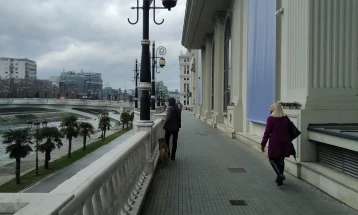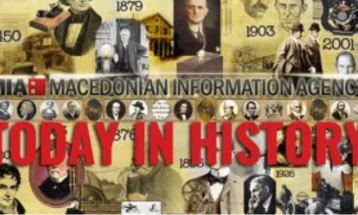Today in history
- 363 – Roman Emperor Julian moves from Antioch with an army of 90,000 to attack the Sassanid Empire, in a campaign which would bring about his own death.
- Post By Silvana Kocovska
- 10:08, 5 March, 2023

5 March 2023 (MIA)
363 – Roman Emperor Julian moves from Antioch with an army of 90,000 to attack the Sassanid Empire, in a campaign which would bring about his own death.
1046 – Naser Khosrow begins the seven-year Middle Eastern journey which he will later describe in his book Safarnama.
1279 – The Livonian Order is defeated in the Battle of Aizkraukle by the Grand Duchy of Lithuania
1496 – King Henry VII of England issues letters patent to John Cabot and his sons, authorising them to explore unknown lands.
1616 – Nicolaus Copernicus’s book De revolutionibus orbium coelestium is banned by the Catholic Church.
1766 – Antonio de Ulloa, the first Spanish governor of Louisiana, arrives in New Orleans.
1770 – Boston Massacre: Five Americans, including Crispus Attucks, are fatally shot by British troops in an event that would contribute to the outbreak of the American Revolutionary War (also known as the American War of Independence) five years later.
1811 – Peninsular War: A French force under the command of Marshal Victor is routed while trying to prevent an Anglo-Spanish-Portuguese army from lifting the Siege of Cádiz in the Battle of Barrosa.
1824 – First Anglo-Burmese War: The British officially declare war on Burma.
1836 – Samuel Colt patents the first production-model revolver, the .34-caliber.
1850 – The Britannia Bridge across the Menai Strait between the island of Anglesey and the mainland of Wales is opened.
1860 – Parma, Tuscany, Modena and Romagna vote in referendums to join the Kingdom of Sardinia.
1868 – Mefistofele, an opera by Arrigo Boito receives its première performance at La Scala.
1872 – George Westinghouse patents the air brake.
1906 – Moro Rebellion: United States Army troops bring overwhelming force against the native Moros in the First Battle of Bud Dajo, leaving only six survivors.
1912 – Italo-Turkish War: Italian forces are the first to use airships for military purposes, employing them for reconnaissance behind Turkish lines.
1931 – The British Viceroy of India, Governor-General Edward Frederick Lindley Wood and Mohandas Gandhi (Mahatma Gandhi) sign an agreement envisaging the release of political prisoners and allowing salt to be freely used by the poorest members of the population.
1933 – Great Depression: President Franklin D. Roosevelt declares a “bank holiday”, closing all U.S. banks and freezing all financial transactions.
1933 – Adolf Hitler’s Nazi Party receives 43.9% at the Reichstag elections. This later allows the Nazis to pass the Enabling Act and establish a dictatorship.
1936 – First flight of Supermarine Spitfire advanced monoplane fighter aircraft in the United Kingdom.
1940 – Six high-ranking members of Soviet politburo, including General Secretary Joseph Stalin, sign an order for the execution of 25,700 Polish intelligentsia, including 14,700 Polish POWs, in what will become known as the Katyn massacre.
1943 – First flight of Gloster Meteor jet aircraft in the United Kingdom.
1944 – World War II: The Red Army begins the Uman–Botoșani Offensive in the western Ukrainian SSR.
1946 – Winston Churchill coins the phrase “Iron Curtain” in his speech at Westminster College, Missouri.
1946 – Hungarian Communists and Social Democrats co-found the Left Bloc.
1953 – The first voluntary blood drive was organised in Macedonia.
1960 – Cuban photographer Alberto Korda takes his iconic photograph of Marxist revolutionary Ernesto “Che” Guevara.
1964 – Milton Manaki, the first cameraman in Macedonia and the Balkans, died in Bitola. He made his first shots in 1905. His main achievements were the story about the visit of the last Osmanli Sultan Reshad to Bitola in 1911 and some other historic scenes. He is a holder of the Ilindenska Spomenica 1903 award, as well as other rewards, such as the 1963 lifetime reward in Pula. He was born in Avdela village in 1880.
1965 – March Intifada: A Leftist uprising erupts in Bahrain against British colonial presence.
1966 – BOAC Flight 911 crashes on Mount Fuji, Japan, killing 124.
1970 – The Nuclear Non-Proliferation Treaty goes into effect after ratification by 43 nations.
1974 – Yom Kippur War: Israeli forces withdraw from the west bank of the Suez Canal.
1975 – First meeting of the Homebrew Computer Club
1978 – The Landsat 3 is launched from Vandenberg Air Force Base in California.
1979 – Soviet probes Venera 11, Venera 12 and the German-American solar satellite Helios II all are hit by “off the scale” gamma rays leading to the discovery of soft gamma repeaters.
1979 – America’s Voyager 1 spacecraft has its closest approach to Jupiter, 172,000 miles.
1981 – The ZX81, a pioneering British home computer, is launched by Sinclair Research and would go on to sell over 1.5 million units around the world.
1982 – Soviet probe Venera 14 landed on Venus.
1984 – Six thousand miners in the United Kingdom begin their strike at Cortonwood Colliery.
1992 – The House of Youth “25th of May” changed its name into the Youth Cultural Centre.
1993 – Airplane Focker 100 of airline Palair Macedonia crashed 400 meters away from the landing track at Petrovec airport in Skopje after takeoff. Eighty out of 91 passengers and crew members died in the crash.
1998 – 1998 Winter Paralympics, the first Winter Paralympics to be held outside Europe, takes place in Nagano, Japan.
2003 – In Haifa, 17 Israeli civilians are killed by in the Haifa bus 37 suicide bombing.
2012 – Invisible Children launches the Stop Kony campaign with the release of Kony 2012.
2012 – At least two people are killed and six injured after a shooting in a hair salon in Bucharest, Romania.
2013 – First winter ascent of Broad Peak by Maciej Berbeka, Adam Bielecki, Artur Małek and Tomasz Kowalski.







